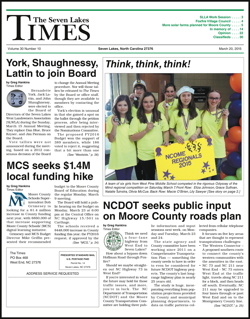 A request by the Town of Carthage to expand its Extra-Territorial Jurisdiction [ETJ] ran into a solid wall of opposition at the October 6 meeting of the Moore County Planning Board. Though the final decision rests with the Board of Commissioners, ETJ expansions are first reviewed by the Planning Board, and that body voted unanimously against recommending approval of the Town's proposed expansion, which covers an additional 5,741 acres, encompassing 371 parcels.
A request by the Town of Carthage to expand its Extra-Territorial Jurisdiction [ETJ] ran into a solid wall of opposition at the October 6 meeting of the Moore County Planning Board. Though the final decision rests with the Board of Commissioners, ETJ expansions are first reviewed by the Planning Board, and that body voted unanimously against recommending approval of the Town's proposed expansion, which covers an additional 5,741 acres, encompassing 371 parcels.
“We are just filling in the gaps,” Carthage Town Manager Carol Sparks told the Planning Board. “We will not tax the residents in the ETJ, and zoning will remain the same. The primary purpose is to allow the town to protect its one mile corridor.”
The Town's written request to the Board of Commissioners explained that a number of satellite annexations over the years has eroded the one-mile ETJ allowed under state law. The expansion was designed to reestablish the full one-mile ETJ.
Sparks explained that inclusion in the ETJ would have little effect on the rural properties included, and that the request was mainly to protect the town and its own zoning, particularly taking note of the proposed 24/27 bypass of Carthage.
Describing the proposed roadway as more of an expressway than bypass, Sparks said Carthage would have a bigger say in where it was located with an expanded ETJ.
However, a small but vocal crowd of rural property owners that would be affected by the proposed action successfully argued that Carthage's proposal offered little, if any, benefit to their properties.
“I am against it. I don’t see any benefit or how it will help me,” said Steve Ingold. “I know the current town board and have a certain amount of trust in them, but we don’t know who will come after them. The next generation might dictate different rules that I’d have to follow.”
Tim Priest, who farms 600 acres in the affected area, gave voice to a point raised by most who addressed the Board: “We are not convinced there are any benefits, and we don’t have any voice in this thing.”
Discussion among Planning Board members echoed that concern.
“I have not heard a compelling reason why the Town of Carthage wants to do this and I see no benefit to these people at all,” said Member Bernie Capstick.
It was not clear, given the cool reception at the Planning Board, Carthage would pursue the expansion with the Board of Commissioners.
Working Lands Protection
Looking to protect forests and farmland in Moore County, the Planning Board unanimously recommended the proposed Working Lands Protection Plan for adoption.
According to NCSU Economics Professor Mike Walden, agriculture is North Carolina’s largest industry, contributing $74 billion to the state's economy. Locally, agriculture is a $373 million industry, providing 13 percent of Moore County jobs.
The Working Lands Plan summarizes both challenges and opportunities faced by local farmers, and was developed to encourage long range policies rather than as a regulatory document.
“I am quite pleased with all that has been accomplished,” said Planning Board Member Rodney Pickler, who served on Consensus Working Group appointed to draft and review the plan. “There has been a lot of work and a lot of people involved in this.”
Vice Chair Martha Blake, who also assisted with the Consensus Group, recognized Planner Jeremy Rust’s significant contribution to the plan.
“I credit him with all the good work that went into this," Blake said. "From what I understand and what I see, this is a great thing. We have to start protecting our farms.”
“The plan’s objectives are clearly sustainable agriculture — and I mean that from an economic standpoint,” said Chair Robert Hayter. “Moore County, except for a few areas, is truly a rural county, and this document makes that clear moving forward.”
Planning staff applauded
The Planning Staff has seen its numbers shrink from a high of seventeen down to the current roster of nine, and the Planning Board took a few minutes during the October 6 meeting to thank the staff for their hard work.
“I have learned that you guys are as good as it comes,” said Chairman Hayter. “You are doing the job professionally every time and I am honored to work with you.”
Acting Director Debra Esminger specifically thanked staff members Tim Garner and Robert Farrell for going above and beyond, serving in multiple capacities — as planners, administrative assistants, and permitting technicians, when needed.
“We are a team and we work together as a team," she said. "We get it done."
Reflecting on her close working experience with the Planning Department over the past three decades, Vice Chair Blake said the staff is the best she has ever worked with.
“Any question I have, they give me an answer. They deserve our respect — and a raise,” she said.
